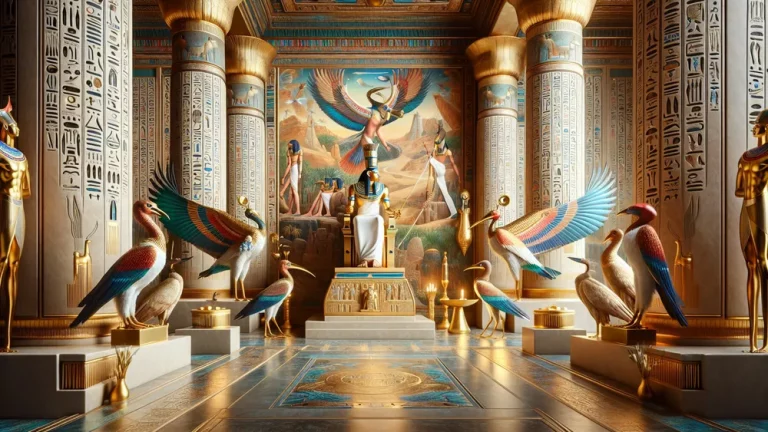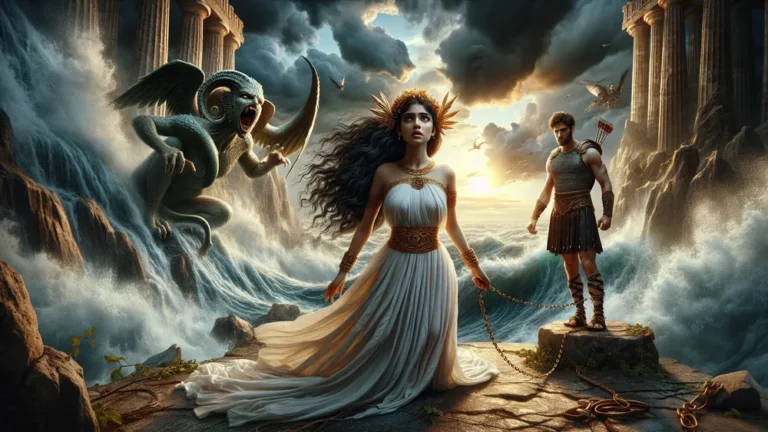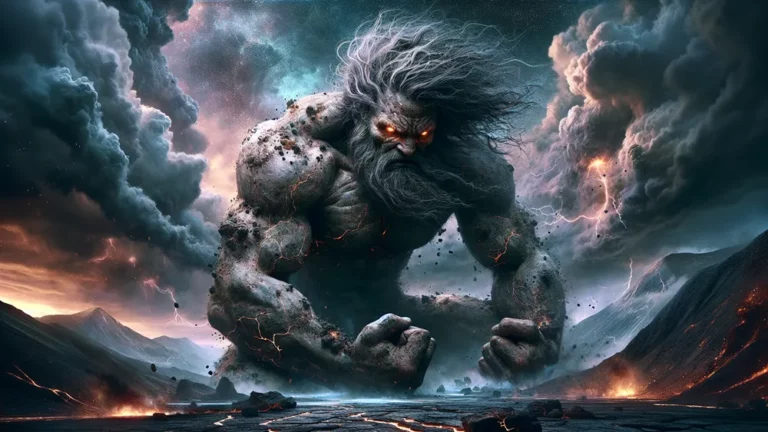Uranus: Greek Primordial God Of The Sky And Heavens
Welcome to a look at Uranus, the Greek primordial god of the sky and heavens. Think about the primordial gods as the base stones of a big structure in mythology, essential yet often not as well-known as the Olympian gods.
Key Points:
- Uranus is a key Greek god, symbolizing the sky and heavens.
- He sprang from Chaos, a void that existed before anything else.
- Uranus hooked up with Gaia, the Earth goddess, to have many mythical beings.
- In his time as the sky god, Uranus kept order in the universe, but ruled with fear.
- Cronus, his son, overthrew and castrated Uranus, sparking a cycle of power struggles in Greek myths.
- Aphrodite, the goddess of love and beauty, was born from Uranus’s blood and sea foam.
- Despite his downfall, Uranus influenced later Greek gods, and his traits appear in other deities, like Zeus.
Reading about Uranus, who came out of the primordial chaos, we can see that he stands for the sky and is a key piece of the old Greek creation story. In this piece, we will look into the beginnings and meaning of Uranus, his union with Gaia, his time in power and eventual fall, and his lasting effect on Greek mythology.
Whether you are new to mythology or want to understand better, this journey through the story of Uranus will give a complete and engaging overview of one of the oldest gods in Greek stories.
Uranus: Overview and Key Facts
| Key Point | Description |
|---|---|
| Name | Uranus (also known as Ouranos) |
| Role | Primordial god of the sky and heavens |
| Beginnings | Came out of Chaos, the empty space from where everything started |
| Partner | Gaia, who is the Earth goddess |
| Children | Titans, Cyclopes, and Hecatoncheires |
| Importance | One of the first gods in Greek myths who represents the sky |
| Traits | Sky, heavens, stars |
| Symbols | Sky, stars, signs of the Zodiac |
| Mythological Role | He kept order in the cosmos, having important mythological kids |
| Downfall | He was overthrown and castrated by his son Cronus; this led to big myth events |
| Legacy | He influenced later gods and myths, a basic part of Greek cosmology |
How Uranus Came to Be
To understand the beginnings and importance of Uranus, we need to look into the myths that tell about his birth from Chaos and his key role in the early cosmos.
The Birth of Uranus and His Role in Greek Mythology
In the wide space of Greek myths, Uranus comes out of Chaos, the empty space that was there before anything else. Chaos, an empty space where things began to take shape. From this void, Uranus was born, being the sky and the heavens.
As the first sky god, Uranus played a critical role in the early universe, covering Gaia, the Earth, and making a boundary between the heavens and the ground world. This split was key in the Greek creation story, as it let the world form and other gods to be born.
Uranus is seen as one of the first gods in Greek stories, often called a basic god because of his early role in the mythological order. His importance in the creation story cannot be overstated; he was not only the sky but also a significant figure in the family tree of the gods.
By having the Titans, Cyclopes, and Hecatoncheires with Gaia, Uranus set the stage for the complex interactions of divine beings that would follow. His presence made the first order in the universe, making him a key character in the stories of Greek myths.
Uranus was a vital figure in Greek mythology, being the first sky god who played a crucial role in creating the world and setting the stage for the birth of other gods, making him a foundational character in the Greek creation story.
Uranus and Gaia: The First Pair
In the big picture of Greek myths, Uranus and Gaia are the first divine couple, being the sky and the earth. Gaia, the Earth goddess, came out of Chaos alongside Uranus. Their bond is like the one between the sky and the earth in our world, where the sky covers the ground.

This first pair’s union was not a romantic or family bond but a basic part of the cosmos, representing the interconnectedness of all things. The bond of Uranus and Gaia was very productive, leading to the birth of many important mythological beings. Among their children were the Titans, a strong race of gods who later played big roles in Greek myths.
They also had the Cyclopes, one-eyed giants known for their power and their craft skills, and the Hecatoncheires, huge beings with many hands and heads. These children were not just characters in separate stories; they were essential to the unfolding story of Greek myths, changing events and shaping the divine order.
The relationship between Uranus and Gaia holds a huge place in Greek myths. Their bond set the stage for the complex interactions of divine beings and cosmic events that came after. By having the Titans, Cyclopes, and Hecatoncheires, Uranus and Gaia made the groundwork for the rise of the Olympian gods and the complex mythological stories that have interested people for a long time.
Their story shows the connectedness of the first elements and the long-lasting impact of their legacy on the mythological world.
Uranus’s Time in Charge
Now that we have looked at the origins and relationships of Uranus, let’s look deeper into his time as the sky god and how he controlled the cosmos.
Uranus as the Sky God
Uranus, the first sky god, controlled the heavens and played a key part in keeping order in the universe. Think of Uranus as a watcher of the sky, ensuring space remained in harmony with the earth below. His role was needed to create a structured universe, as it split the heavens from the earthly world and provided a stable place for other gods and beings.
This split was not only physical but also a symbol, which means the balance and order that were basic to the Greek view of the universe.
Uranus’s time as the sky god had many features and signs that showed his power and importance. Here are some main features tied to Uranus:
- Sky and Heavens: Uranus stood for the sky, which means the wide space above the earth.
- Stars and Other Bodies: He was linked to the stars and other bodies in space, appearing as the overseer of the night sky.
- Cosmic Order: His role in keeping cosmic order made him a sign of stability and structure in the universe.
- Fatherhood: As the ancestor of many key gods, Uranus stood for the idea of divine family and continuity.
These features highlight Uranus’s key role in Greek myths, showing his importance in creating and keeping the universe stable.
The Tyranny of Uranus
Uranus ruled his children with control and fear, trying to keep his power and stop any threats to his control. Afraid that his children might take over one day, Uranus took extreme steps to hold them back. He locked up the Cyclopes and Hecatoncheires in Tartarus, a dark and deep pit, to keep them from rising against him.
This act is like a ruler who jails potential rivals to make sure he stays in charge. Uranus’s actions of tyranny made an atmosphere of fear and anger among his children, setting things up for them to rebel later. More than just what Uranus did, his control meant a lot for Greek myths. His harsh rule and the rebellion by his son Cronus are key events that shaped the story.
By trying to stop his children from gaining power, Uranus started a cycle of fights and takeovers that would define the gods’ relationships. This cycle of overthrowing and renewal is a common theme in Greek myths, showing the changing and often rough nature of divine power. Uranus’s actions mean the certainty of change and the constant struggle for power among the Greek gods.
The Fall of Uranus
After we looked at Uranus’s strict rule, let’s see the big events that led to his downfall and the significant effects that followed.
The Castration of Uranus by Cronus
Cronus’s rebellion story against Uranus is one of the biggest events in Greek myths. Uranus’s harsh rule brought great pain to his children, who were kept locked up in Tartarus. Gaia, the Earth goddess and their mother, could not stand their pain, so she made a plan to take down Uranus.
She made a great sickle and asked her children to rise against their cruel father. Only Cronus, the youngest Titan, had the courage to take the sickle and face Uranus. When Cronus attacked, he cut Uranus, ending his rule over everything.
The main things leading to Uranus’s fall and what they mean:
- Gaia’s Plan: Gaia was upset by Uranus’s cruelty, so she made a sickle and asked her kids to fight back.
- Cronus’s Courage: Only Cronus, among Gaia’s children, dared to act against Uranus.
- The Attack: Cronus surprised Uranus, using the sickle to cut him, which meant the end of Uranus’s power.
- Separation of Heaven and Earth: The cutting meant the clear split of the sky (Uranus) from the earth (Gaia), starting a new order.
After Uranus was taken down, there were big effects for the Greek gods. With Uranus out of power, Cronus and the Titans took over, starting a new time of rule. But, this didn’t end the fights and takeovers. The blood from Uranus fell to the earth, creating new beings like the Erinyes (Furies) and the Gigantes (Giants).
This also led to the future rise of the Olympian gods, led by Zeus, who would later beat Cronus and the Titans. Uranus’s fall marked a key moment in Greek myths, showing the endless cycle of power struggles and the changing ways of the divine order.
The Birth of Aphrodite from Uranus’s Blood
The myth about Aphrodite’s birth is one of the most interesting stories in Greek myths. The myth says that when Cronus cut Uranus, he threw his parts into the sea. From the mix of Uranus’s blood and sea foam, Aphrodite, who is the goddess of love and beauty, appeared. Think of the sea as big and chaotic. From this chaos, the most beautiful god was born.
This picture shows how Aphrodite came from disorder, meaning beauty and love came out of chaos in the world. What makes Aphrodite’s origin important is more than just her story. It really affects her character and role in Greek stories. The fact that Aphrodite came from sea foam means she is linked to both basic forces of nature and the divine.
It means she has two sides: physical beauty and special power of love. This story also leads to her many tales with other gods and people, making her a big part of Greek myths. Her birth from such a big and violent act adds many layers to who she is, showing how love and beauty can come out of the most chaotic and crazy times.
Aphrodite’s birth from chaos is crucial as it defines her dual nature and importance in Greek mythology, emerging as a symbol of beauty and love from a turbulent origin.
Uranus’s Influence in Greek Myths
After we looked at the big fall of Uranus and what happened right after, now we can see the long-term effects he had on Greek myths and later gods.
The Influence of Uranus on Later Deities
Uranus’s legacy as the first sky god had a big effect on the later Greek gods and goddesses. As the first god for the sky, Uranus started the idea of divine authority and cosmic order. He set up the concept of a sky ruler, which appears in the rules of later gods like Zeus.
Zeus, who was the king of the Olympian gods, took over as the sky god, using thunderbolts and keeping order in the heavens, much like Uranus did before. This means how Uranus’s initial control of the sky set up the hierarchical structure of the Greek gods. Furthermore, his traits and qualities also appeared in other gods, reflecting his lasting influence.

For instance, the power and authority Uranus had mirrored the rule of Cronus, his son, and later Zeus, his grandson. Besides, the complicated relationships Uranus had with Gaia and his kids can be seen in the tricky family ties of the Olympian gods.
The themes of rebellion and taking over, which began with Uranus’s fall, kept happening in the stories of the Titans and Olympians, showing a repeated pattern of power struggles. By looking at these links, we see how Uranus’s traits and legacy spread through Greek myths, shaping the stories and qualities of many gods that came after.
Uranus in Ancient Greek Culture and Worship
In ancient Greek culture, people saw Uranus as a distant yet basic figure among the gods. As a first god, he was not respected with the same excitement or in the same way as the Olympian gods like Zeus or Athena. So, they respected Uranus more as a symbol of the sky and the heavens.
Him being in the creation story and being the father of the Titans and other important gods showed his importance in the cosmic order. But there were no big temples or lots of cults for Uranus, showing his more abstract and overall presence in Greek myths.

To better understand Uranus’s place in ancient Greek worship, it helps to compare him with other first gods. The following table gives a comparison:
| Deity | Role in Mythology | Worship Practices | Significance |
|---|---|---|---|
| Uranus | First Sky God | Few direct worship, symbolic | Father of Titans, cosmic order |
| Gaia | Earth Mother | Many cults, temples, rituals | Mother of all life, nurturing force |
| Chaos | First Void | Abstract idea, no direct worship | Source of creation, cosmic origin |
| Tartarus | Abyss, Dungeon of Torment | Few direct worship, symbolic | Place of punishment, cosmic depth |
As you can see, while Gaia had many cults and temples dedicated to her nurturing and life-giving sides, Uranus’s worship was more symbolic, reflecting his role as a distant and overall figure. This comparison explains how different first gods were respected in ancient Greek culture, each showing unique parts of the cosmos and creation.
Uranus’s influence, though not directly worshipped a lot, was deeply set in the myth stories, shaping the narratives and roles of many gods that came next.
The First Gods of Greek Mythology
After we looked at how Uranus affected and was worshipped, you can find out here more about all the Primodial Deities in Greek mythology.

FAQs
1. Who were the children of Uranus and Gaia?
The children of Uranus and Gaia include the Titans, Cyclopes, and Hecatoncheires.
2. What is the significance of Uranus’s castration?
The significance of Uranus’s castration lies in its symbolic representation of the overthrow of primordial chaos and the establishment of a new cosmic order.
3. How is Uranus depicted in ancient art?
Uranus is depicted in ancient art often as a celestial figure or a bearded man, symbolizing the sky.
4. What is the modern interpretation of Uranus in mythology?
The modern interpretation of Uranus in mythology often views him as a symbol of primordial chaos and the cyclical nature of power and rebellion.







